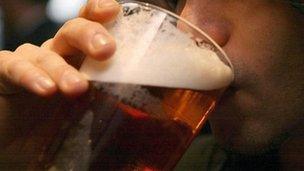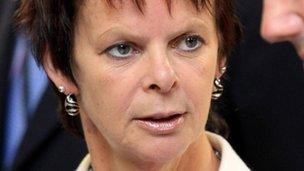Alcohol warnings 'still being ignored', minister says
- Published

Anne Milton said MPs were "susceptible" to problem drinking because of their working hours
Many people still do not accept the harm that alcohol can do to their bodies, despite government warnings, the public health minister has said.
Anne Milton told MPs that was in contrast to the risks of smoking and obesity which were acknowledged.
She said the Department of Health was in "ongoing discussions" with the Treasury on how alcohol pricing could be used to encourage safer drinking.
But she said setting a minimum price per unit was "probably illegal".
Ms Milton was giving evidence to the House of Commons science and technology committee,, external which is looking into the evidence base for current alcohol guidelines.
She said that despite the incidence of problem drinking, there was not currently any evidence available to justify altering the recommended safe limits.
And there was, she acknowledged, a "difficulty" with guidelines full stop because people were inclined to disbelieve any messages about what to do - and what not to do - that come from government.
'Very, very drunk'
"I think [the guidelines] have an impact in as much as we know that the first step in changing behaviour is people being aware of the harm it can cause," she said.
"[But] I still think that whereas people accept the harm that smoking causes, they accept the problems being overweight causes, there is still some issue about accepting the harm that alcohol causes.
"I think that's still a message that we haven't got through in the guidelines."
Even where people do accept the risks, the minister said, some still carry on regardless.
"People do things that they know harm their health, so 22% of people still smoke," she told the committee.
"We do have to look at why it is that people feel the need to go and get very, very drunk and harm their health."
Ms Milton said it was unclear whether price changes were really able to alter habits, particularly among problem drinkers, pointing out that 80% of alcohol was drunk by one-third of the population.
But she said the government's new alcohol strategy, expected later this year or early in 2012, "will say more about what we are going to do on price", and measures taken already - raising the duty on strong beer and cutting it on weaker varieties - were having an effect.
"Already, there has been a response from the industry," she said. "Already they are dropping the alcohol strength to get below that duty level.
"There is no doubt about it, price can manipulate the market, so increasing duty on high-strength alcohol is not a bad idea, because for every litre sold there is less alcohol in it, which is a move in the right direction."
Scotland is planning to introduce a minimum price per unit for alcohol, but Ms Milton said the move was probably illegal under European trade laws and would be challenged.
However, Labour's shadow public health minister Diane Abbott said the government should be prepared to look at minimum pricing.
MPs 'susceptible'
"A recent report predicted that binge-drinking will cost the NHS £3.8 billion by 2015, with 1.5 million A&E admissions a year," she said.
"In Scotland, Alex Salmond is pushing ahead with minimum pricing policies, and yet in England there is a deafening silence where a substantive strategy should be."

Anne Milton said there was "no one magic bullet" to solving the problem of alcohol abuse
Ms Milton insisted she had "an appropriate degree of cynicism" about industry campaigns to promote responsible drinking, but she believed companies did not want their brands to be "associated with crime, anti-social behaviour and people being paralytically drunk".
She said about 80% of the major drinks companies had agreed to introduce labelling with information about units and warnings for pregnant women.
She said there was "no one magic bullet" to solve alcohol abuse, and local alcohol campaigns were likely to worked best because consumption patterns were so varied.
The minister also said MPs were "susceptible" to "risky behaviour" like excessive drinking because of their anti-social hours and the time they spent away from family.
But she said she did not believe some of Parliament's many bars should be shut down in a bid to make them more sober.
- Published23 October 2011
- Published2 October 2011
- Published1 October 2011
- Published22 July 2010